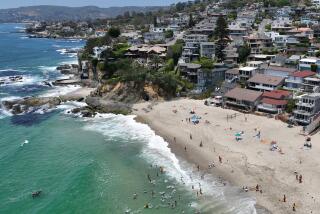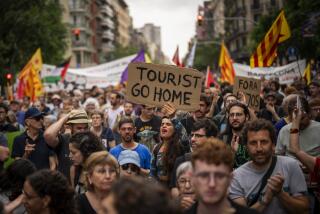Rio Struggles to Contain Violence on the Eve of the Tourism Season
- Share via
RIO DE JANEIRO — A wave of assaults on tourists in this seaside resort city has authorities scrambling to contain the violence as they prepare for the annual high travel season.
With every summer comes a spike in crimes against visitors, who flock to Rio to soak up the Southern Hemisphere sun and join the revelry of New Year’s and Carnaval, the two biggest events on the social calendar.
But Brazilian authorities say the upsurge in brazen assaults, one of them fatal, since the beginning of November, came earlier than anyone had expected.
Authorities have posted surveillance cameras and beefed up patrols at key tourist spots, including some of the world’s most storied beaches, in Copacabana and Ipanema.
Police have also rounded up dozens of street children in a campaign that human rights advocates decry as both heavy-handed and ineffectual.
Officials are eager to suppress anything that might discourage tourism, which brought in $350 million last summer. But they have had difficulty stifling reports of Rio’s losing battle with crime, including a murder rate that dwarfs that of any American city, regular shootouts between rival drug gangs, and street muggings, often at gun- or knifepoint.
Especially worrisome has been the well-publicized assaults on vacationers, particularly the Nov. 12 robbery of a Japanese woman.
The woman, identified as Yoshiko Magoshi, was attacked in front of one of Rio’s tonier hotels, the Copacabana Palace, only hours after she arrived in the city. Resisting a group of thugs, Magoshi was stabbed in the abdomen and then hit by a car when she ran in panic into the street outside the hotel. She remains in the hospital in serious condition.
The incident shocked residents already accustomed to frequent stories of violence. Headlines soon began piling up of more attacks on foreign visitors throughout Rio: a Spaniard shot to death by muggers while strolling with his wife, an entire busload of Angolans robbed while out touring early one morning, five French travelers overpowered in their hotel rooms by armed assailants.
During one weekend, Nov. 12 to 14, there were 21 reported assaults on tourists. Several of the attacks occurred in the Zona Sul, home to the city’s most famous beaches and resorts.
In response, police have taken to patrolling the strand in plainclothes and with cameras, keeping an eye on suspicious-looking youths.
“This is a new practice that was already under study but had to be put into effect ahead of schedule because of the [recent] incidents,” said Claudia Guerreiro, a public security spokeswoman for Rio de Janeiro state. “The measure was supposed to begin with the onset of summer, which hasn’t officially started yet.”
The Brazilian Hotel Industry Assn. is preparing a tourist manual containing safety tips, to be distributed at the airport and in hotels next month.
“In reality, tourists are a target all over the world,” said Alfredo Lopes, the association’s president. “They speak like tourists, dress like tourists.”
Hotel occupancy rates -- close to 70% -- are higher than usual, and few cancellations have been reported, at least by international travelers. Domestic tourists, who compose the lion’s share of visitors, “are more concerned and question the situation more,” said Gracie Croce of the city’s tourism department.
Officials jealously guard Rio’s reputation as a sunbaked paradise and take vociferous exception to anything that might stain its image, especially in the foreign media.
When a British newspaper published a lengthy article last month describing Rio as “the city of cocaine and carnage,” officials denounced the story as sensationalized. That, in turn, triggered a flood of letters to local newspapers from residents praising the article and accusing the government of being blind to what was happening in its backyard. Rio’s own media often refer to the city’s soaring crime problem as a war.
Measures to stem the tide seem to have limited or no effect.
Last week, police arrested nearly 200 street youths over three days as part of “Operation Safe Tourism,” the daily O Globo reported.
Out of 147 who were to be sent to a central processing center, however, 130 managed to flee, some by scaling walls.
Police officials have pledged to conduct daily roundups until the end of summer.
“We’re trying to help, but we don’t have the necessary support,” Jose Renato Torres, the deputy chief of the Civil Police, told the newspaper.
More to Read
Sign up for Essential California
The most important California stories and recommendations in your inbox every morning.
You may occasionally receive promotional content from the Los Angeles Times.














